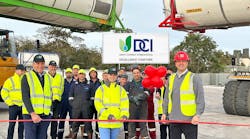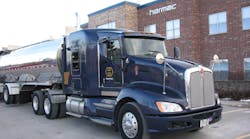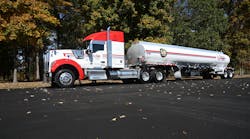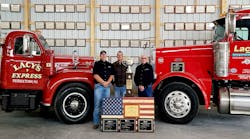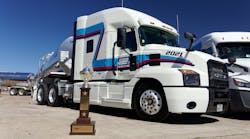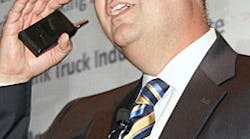MAP-21, the Moving Ahead for Progress in the 21st Century Act, was signed into law by President Obama on July 6, 2012, and provides funding for surface transportation programs at over $105 billion.
The problem, according to Warren Hoemann, senior vice-president industry affairs of American Trucking Associations (ATA), is that the highway funding legislation only applies to fiscal years 2013 and 2014.
“It doesn’t get us very far in terms of highway funding, and we have major issues in front of us,” he said during the 65th National Tank Truck Carriers Annual Conference held April 28-30 in Austin, Texas. “But we’re in a pattern on the legislative and regulatory side where we have to make sure that what we talked about in MAP-21 and what we are actually able to write into a bill are some very good provisions that actually get implemented. It’s not enough just to write a law. You have to have follow-through.”
Part I of his top ATA legislative issues for the 113th Congress:
• Stabilization of the Highway Trust Fund.
“We’ve only had a two-year bill,” he said. “We had an influx of about $50 billion out of the general fund. But we have not had an increase in federal highway taxes in a long time. So we’re coming up quickly on 2015, when the highway trust fund won’t have any money. We have to find a way of getting money into the highway fund. Our choice and NTTC’s first choice is an increase in the federal fuel tax. I just said a bad word. I said the word tax. We hear tolling proponents talk about tolling all roads and hear people promoting private-public partnerships where the private portion will be repaid by profits they made on roads. We hear people proposing vehicle model taxes and calling them fees or user charges.
“We had a reception for Congressman Roger Williams (R-TX) the other day. When he was told, ‘The most efficient way of collecting highway revenue right now is a fuel tax and we as an industry are willing to step up,’ the first thing that went into his mind—thinking like a Congressman who’s always running for re-election—was that we might have $5-a-gallon fuel. And politically that might not sell. Fortunately, we have had moderation in fuel costs recently and Congress has been a little more receptive. What they might be more receptive to is a modest increase with an index in fuel tax. Recently, we’ve seen three states go to a fuel-tax increase, so we know it’s more politically palatable than it was last session. We had hearings (during the week of April 22) going on at the same time in the Committee on Transportation and Infrastructure. One hearing was a freight panel where we had two witnesses from trucking talking about freight movement. Both agreed on the record that we should have a federal fuel tax to support infrastructure. Across the hall, the committee had a budget meeting, and there was no receptivity at all. So it’s a tough lift.”
• CSA oversight.
“We told Congress we like the intention of the Compliance, Safety, Accountability program. We support the program. We like the fact that FMCSA (Federal Motor Carrier Safety Administration) has been responsive and made positive changes, but there is a ways to go. We’ve asked Congress to give oversight on that. They responded in MAP-21. Congress ordered there be an Inspector General study of CSA. There’s also one of the general accountability office going on right now. It’s not to find fault or point to FMCSA and say, ‘You’ve done wrong.’ It’s to say, ‘Improvements can be made. Let’s be sure that crash accountability is taken care of. Let’s remove from the record of trucking companies those crashes which were clearly unavoidable.’ If we look at head-on collisions, the vast majority between cars and trucks have occurred when a car has crossed a median—sometimes even a divider—and crashed into a truck. There always will be close calls on issues, but let’s take the clear ones and get them off the table. We also said to Congress, ‘Let’s be sure when FMCSA comes out with a safety fitness ruling, which is still scheduled later this year, that the measurements they put up to say your company is safe or not really ties back to crashes.’ We have found that a couple of BASICS in CSA have no statistical correlation to crashes, so let’s be sure we’re telling the right message when we put up a safety score for a carrier.”
• Truck productivity increases.
“In MAP-21, we were able as an industry to get into the original draft bill, almost whole laundry list of what our industry wants in productivity. For the tank truck industry, that’s not your major issue, but it has been for other areas, everything from auto transporters to less-than-truckload freight to even truckload carriers saying there is truck productivity we can support. The bill did not survive committee hearings, but we are back talking to Congress, because in the future we’re going to have a lot more trucks on the road and more productive trucks and be able to find drivers for them.”
Part II:
• Comprehensive tax reform.
“This is not just a trucking issue obviously, but you’ve heard from the business community particularly when dealing with the fiscal cliff: ‘Why don’t we just clean up the tax code? Everybody will be a lot more productive if they’re not taking exemptions and carving out loopholes and wouldn’t be spending this unproductive time dealing with taxes. Congress is having hearings on that, and ATA’s hill staff is meeting regularly with them on that, but it’s going to be a slow slog because it’s so very complex. We reached out to fleet members and said, ‘If we have comprehensive tax reform, what provisions of the current document do you want to retain or change?’ Obviously, people know bonus depreciation and accelerated depreciation helps them buy equipment. It is good in the current environment. But the fact is, everybody’s coming from every interest and saying the same thing for their provisions. If we’re going to have comprehensive tax reform, everything is going to have to be on the table. If you want lower corporate tax rates, you may have to give up some of the sacred exemptions and incentives you currently have.
“The second huge issue in our industry is often that family-owned companies are taxed at the personal-tax level not at the corporate-tax level. So if you’re going to have comprehensive tax reform, that gives you incentive that you need changes in personal-tax and income-tax levels, not just corporate, and that adds to the complexity. It’s on the table and we’re active. It’s a very difficult lift because it involves so many interests.”
• Federal Excise Tax.
“As an industry, we would like to get rid of that so vendors are not penalized for the cost of equipment you purchased. It’s getting ever more costly. If you want to switch over to natural gas or want to add safety technologies to equipment, you pay FET on these technologies. In this environment where we’re talking comprehensive tax reform in the mix and in the environment where tax increases themselves are difficult to say that we want to switch one tax for another, we have to get over the burden of that one word: tax. We’re making progress, but it’s going to be difficult.”
Top policy/regulatory issues for 2013, Part I:
• Electronic logging devices.
“That was in MAP-21, where Congress agreed with us that FMCSA should come up with a final rule within a year on electronic logging devices. So we’re talking to Congress and saying, ‘Let’s be sure there really is follow-through.’ And we’re talking to the agency, saying, ‘Let’s get going.’ One of the problems is that in the first iteration of electronic logging devices, FMCSA did not cover the issue of driver harassment, so the agency had to do a study on whether there is driver harassment that could be caused through the use of electronic logging devices. We anticipate by the first of next year, we will have a notice of proposed rulemaking to respond to, but we have to continue to push on the Congressional and FMCSA sides.”
• Compliance, Safety, Accountability (CSA).
“We talked to Congress about making sure there is a discorrelation between basic measurements and actual crashes to take crashes that are unavoidable out of the mix and adjust severity weights. We’re working with FMCSA saying, ‘Look, you still have it on the regulatory agenda.’ Every regulatory body publishes a semi-annual agenda of what it intends to do over the coming year. On the agenda, of course, is safety fitness rulemaking for the trucking industry. We’re saying to FMCSA, ‘You’re not ready because there still are adjustments that need to be made in CSA itself. You also have two studies going on. You have to wait for those reports.’ We continue to work with FMCSA.”
• Drug and alcohol clearinghouse.
“This was MAP-21. We’ve got a provision in there saying that we need a clearinghouse and must get a yes or no on whether this applicant has tested positive on a drug or alcohol test. That has moved along. We asked Congress to make sure the agency followed through, and the agency has. It’s now over at the Office of Management and Budget for its review, and we’re making real progress on that.”
Part II:
• MAP-21 freight provisions implementation.
“We were successful as an industry again in putting into MAP-21 a requirement that the Department of Transportation look at how freight moves on our highways. It was a highway study. DOT is trying to change it into a multimodal study. We are working all the time with the department to make sure highways get adequately represented because that is where freight moves. The MAP-21 study was required so that it could be a focus for where money is spent, so that we could improve the highway infrastructure and freight bottlenecks.”
• Security threat assessments/credentials.
“We’re trying to eliminate duplication of credentials that have to be carried, so that your drivers don’t have to go through more than one screening. It’s very tough because you’re talking to different agencies, and they have their own ownership of each of the credentials. But we’re making progress there.”
• Truck safety technologies.
“This is a vast array of everything that FMCSA and National Highway Traffic Safety Administration may have under consideration for possible mandate for carriers. We’ve already have a Notice of Proposed Rulemaking on roll stability. That’s something where NTTC took the lead as an industry and said, ‘Yes, we need this.’ Our own research arm said that for some carriers, roll stability is better than electronic stability controls, and for others not, so please give the option.’ We’re waiting for that response.” ♦

